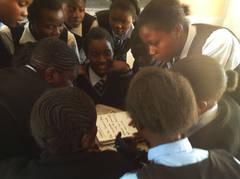
Sexuality education and the provision of services for adolescents and young people are at the heart of a recently launched national programme, implemented by the Government of Zambia and supported by UNESCO.
The programme, launched in April 2014, will reach 1,750 000 students, aged between 10 and 24, with a new comprehensive sexuality education curriculum and some 45,000 new and existing teachers will be trained over the next four years. New teaching and learning materials will be developed and schools will also be advised on policies and codes of conduct to reduce current high levels of gender-based violence and HIV-related stigma and discrimination.
“Girls in particular are at high risk of HIV in Zambia because they may not be in a position to negotiate safer sex or don’t know enough about how to prevent the infection from being transmitted. We know from experience that if all learners, male and female, have the right education we can prevent and reduce the number of new infections,” Chris Castle, UNESCO Global Coordinator for HIV and AIDS said.
Plans to give young people easier access to HIV testing and other necessary medical services will also be implemented. The overall goal is for adolescents and young people in Zambia to enjoy better sexual and reproductive health, with a focus on preventing new HIV infections and unintended pregnancies.
Young people in the East and Southern Africa region are highly vulnerable to unintended pregnancies, HIV, sexual abuse, early marriage, HIV and sexually transmitted infections. In Zambia, 28% of girls under the age of 19 have already had at least one child and the HIV prevalence rate is 8.7% among girls aged 15-24 and 4.3% among boys the same age.
Harriet Tembo, aged 15, a student at Kabulonga Basic School in Lusaka, Zambia, says she thinks that the new sexuality education curriculum is important for young people: “I think the knowledge which I’m going to receive will help me to stay in school longer and it will also make me focus on my future and help me achieve my dreams.”
Existing HIV prevention programmes in the country are not delivering the desired levels of knowledge, combined with the skills and values that will enable young people to make and act on healthy decisions. Poor quality curricula, lack of properly trained teachers and inappropriate teaching methods and learning materials, among other factors, have limited the effectiveness of HIV education in schools. Gender inequality and gender-based violence are also serious challenges in schools and communities, affecting educational and economic prospects for girls and increasing their HIV risk.
The 3.9 million US dollar programme, funded by the Swedish government, will provide direct support and capacity building to the Ministry of Education to strengthen its existing life skills programme between 2014 and 2018. UNESCO has been working closely with the government of Zambia on HIV and sexuality education for eight years. This new programme builds on previous achievements such as the development of new sexuality education curricula in 2013 and significantly intensifies work with ambitious new targets and the ability to reach up to 80% of all learners in grades 5-12.
The project is being implemented in close collaboration with other partners, namely: the Ministry of Health, Ministry of Community Development, Mother and Child Health, Ministry of Youth and Sport, Ministry of Gender and Child Development, Ministry of Chiefs and Traditional Affairs, the National AIDS Council, UNFPA, UNICEF. The following NGOs are also key partners: SAfAIDS, Youth Vision, Churches Health Association Zambia (CHAZ), Save the Children, Zambia Interfaith Networking Group on HIV/AIDS (ZINGO) and the Planned Parenthood Association of Zambia (PPAZ).
UNESCO’s global HIV programme supports comprehensive sexuality education, the elimination of school-related gender based violence and support for people living with HIV in over 75 countries around the world.
